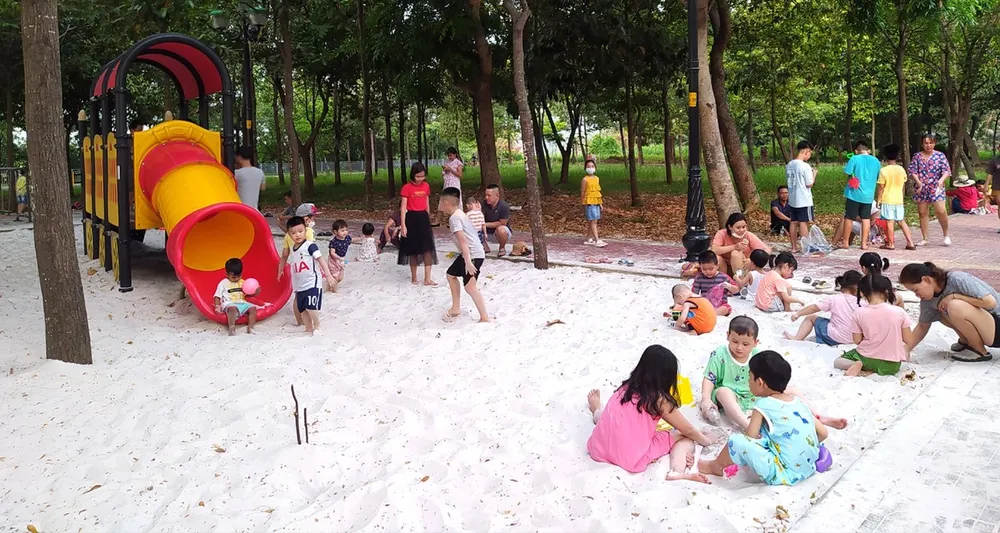Small story
Glancing quickly at the phone screen - where the movie was reaching its climax - then looking down at the floor where his little daughter was laying out all her toys, Mr. Cong caught a sweet, pleading look. He smiled and put the phone aside. Immediately, the little girl's eyes lit up as her father was ready to join in.
The little girl excitedly pulled her father into the tiny “kitchen” with: gas stove, refrigerator, pots, vegetables, fruits, dishes… All were toys, but arranged meticulously like a real kitchen. The two of them started an imaginary party filled with laughter.
Like a small shop owner, the little girl said in a clear voice: “Please choose your dishes!” and then continuously introduced the menu, from main course to dessert, and urged her father to choose quickly. It was just a pretend game, but seeing her father excitedly playing his role, the little girl could not hide her joy.
“Before, every time my child invited me to play, I was usually busy with my own things so I just sat there without really paying attention. I just thought that my child was happy and that was enough,” Mr. Cong admitted.

As for Ms. Ngoc Anh (office worker, residing in Hiep Binh Phuoc ward, Thu Duc city, Ho Chi Minh city), although she regularly takes her child to the park or playground every week, she is often startled by what her child says. Usually, she lets her child freely choose the game, while she observes from afar.
“I think just being close enough to react in case something happens is enough,” she shared. If the child finds a friend with the same “taste,” he will play happily, even forgetting about his parents. But many times, when the child beckons her to play with him, she blurts out, “Go ahead and play.” Seeing the child playing alone, she tells herself, “He’s still happy, so he’s probably fine.” At that time, she takes the opportunity to surf the phone or chat with other parents.
Until one day, her 6-year-old son suddenly said: "Every time I ask you to play, you say you're busy, you're tired. Or do you not like playing with me?" She was speechless, not knowing how to answer her son or herself.
Accompanying the child
In the modern world, not all parents have enough time to both help their children study and accompany them during their playtime. Many families find themselves in a situation where one parent takes on all the responsibility of taking care of their children, while the other parent chooses to relax on the phone or TV, leaving their children to play alone.
The phrase “quality play with children” is increasingly mentioned, understood as spending time with children in a complete, meaningful way, and creating a deep connection between parents and children. Not just “being present” with children, but actually participating, listening and exploring and learning with children.
The most important thing about playing with your children is not only how long, but more importantly how you play. Little time but used properly can still become precious moments, helping to strengthen family ties, nurture children's souls and contribute to the formation of healthy personalities and emotions for children.
This, more than anyone else, has been verified by Mr. Cong himself. Every day after work, instead of using his phone to entertain himself, he usually spends 20-30 minutes playing with his children.
“I feel that my baby is not only happier but also looks forward to these playtimes. There are things that I could not grasp before, such as changes in his interests, emotions, psychology... but now he really likes to talk about them because his father listens,” he confided.
The experience that Ms. Anh has learned is that she cannot be there to play with her child whenever she wants. However, she can choose a certain time of the day, dividing which game will be played by the father or mother.
For example, her son loves building games and Lego, so she assigns that role to her husband. Meanwhile, she actively talks and plays role-playing games with him.
Ms. Anh also said that at times like that, she would also give her child some light tasks to help her parents, making her feel more trusted and more willing to participate. She considered this an effective initiative combining learning - playing - working with her child. Everything after that, gradually formed good habits for her child.
Playing with your child doesn’t have to be perfect or all the time. Most importantly, your child always wants to feel sincere and positive companionship. Even if it’s only 15-30 minutes a day, if you are truly present, without phone calls, emails, or distractions, that time will leave a deep mark on your child’s soul. That’s the way to raise with love, from the simplest things.
Source: https://www.sggp.org.vn/yeu-thuong-chat-luong-post799529.html


![[Photo] General Secretary To Lam attends the 8th Congress of the Central Public Security Party Committee](https://vphoto.vietnam.vn/thumb/1200x675/vietnam/resource/IMAGE/2025/10/4/79fadf490f674dc483794f2d955f6045)


![[Photo] Solemn opening of the 8th Congress of the Central Public Security Party Committee, term 2025-2030](https://vphoto.vietnam.vn/thumb/1200x675/vietnam/resource/IMAGE/2025/10/4/f3b00fb779f44979809441a4dac5c7df)
![[Photo] Bustling Mid-Autumn Festival at the Museum of Ethnology](https://vphoto.vietnam.vn/thumb/1200x675/vietnam/resource/IMAGE/2025/10/4/da8d5927734d4ca58e3eced14bc435a3)





























![Bringing G-DRAGON 2025 WORLD TOUR [Übermensch] to Vietnam, 8Wonder turns the impossible into possible](https://vphoto.vietnam.vn/thumb/402x226/vietnam/resource/IMAGE/2025/10/4/f2e1e99f90a54c788bb3acaba910ba8b)



























![[VIDEO] Summary of Petrovietnam's 50th Anniversary Ceremony](https://vphoto.vietnam.vn/thumb/402x226/vietnam/resource/IMAGE/2025/10/4/abe133bdb8114793a16d4fe3e5bd0f12)
![[VIDEO] GENERAL SECRETARY TO LAM AWARDS PETROVIETNAM 8 GOLDEN WORDS: "PIONEER - EXCELLENT - SUSTAINABLE - GLOBAL"](https://vphoto.vietnam.vn/thumb/402x226/vietnam/resource/IMAGE/2025/7/23/c2fdb48863e846cfa9fb8e6ea9cf44e7)





























Comment (0)